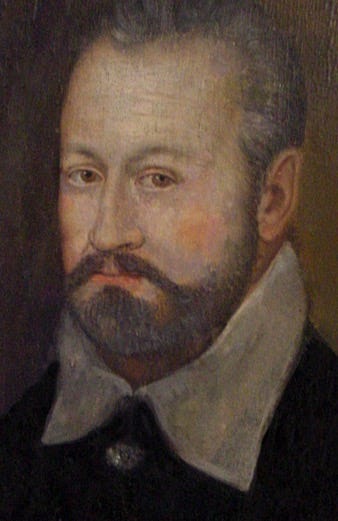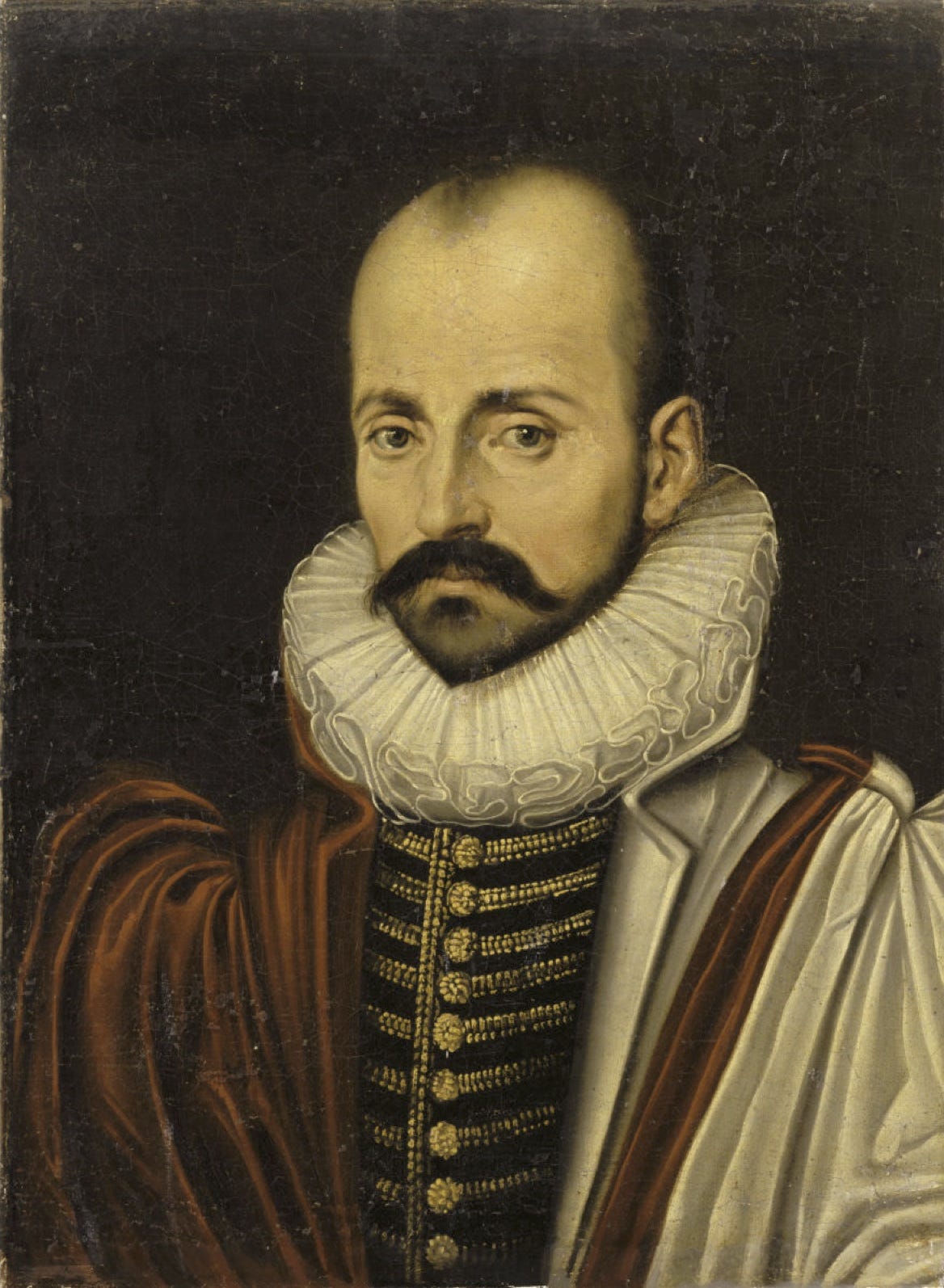Happy Birthday, Michel de Montaigne
Born February 28, 1533, Guyenne, France | Died September 13, 1592, Guyenne, France
Today, the Best American Essays newsletter celebrates the French philosopher and essayist Michel de Montaigne on the 492nd anniversary of his birth. Describing his associative, introspective form of prose, Montaigne used the term essai, which means “trial” or “attempt,” and with it launched a new literary form combining the discursive contemplation of quotidian and philosophical subjects, literature, historical and contemporary events with personal anecdotes and lucid self-regard.
Subscribe to our newsletter for news about upcoming online conversations with Best American Essays contributors about essayists.
“When I am attacked by gloomy thoughts, nothing helps me so much as running to my books. They quickly absorb me and banish the clouds from my mind.”
Montaigne circa 1570, unknown artist
“The most fruitful and natural exercise for our minds is, in my opinion, conversation.”
First published work: Essais, 1580

The essays, Montaigne wrote, were “a register of varied and changing occurrences, of ideas which are unresolved and, when needs be, contradictory, either because I myself have become different or because I grasp hold of different attributes or aspects of my subjects. So I may happen to contradict myself but, as Demades said, I never contradict truth.”
English translations of Montaigne’s collected essays:
The essayes, or, Morall, politike and millitarie discourses of Lo. Michaell de Montaigne, Knight of the noble Order of St. Michaell, and one of the gentlemen in ordinary of the French King, Henry the Third his chamber : the first booke, translated by John Florio (Edward Blount, 1603). This is the edition Shakespeare read.
Essays of Montaigne, translated by Charles Cotton (in 1685—86); revised by William Carew Hazlett (Edwin C. Hill, 1910).
The Complete Essays of Montaigne, translated by Donald Frame (Stanford University Press, 1957)
The Complete Essays, translated by M. A. Screech (Penguin Classics, 1991; rpt. 1993).
See also, works by authors whose essays have appeared in The Best American Essays series (R) or have been listed in Notables (N):
Robert Atwan, “Foreword,” The Best American Essays 2018 (Foreword)
Robert Atwan, “Of Essays and Essayists,” The Best American Essays 2015 (Foreword)
Jane Kramer, “Me, Myself, and I,” The New Yorker, 2007 (R)
Judith Hertog, “Running with Montaigne,” Crab Orchard Review, 2019 (N)
Patricia Hampl, “Montaigne's Lute,” Gulf Coast, 2015 (N)
Robert D. Zaretsky, “Montaigne's Foot,” Southwest Review, 2002 (N)
Hilary Masters, “In Montaigne's Tower,” The Ohio Review, 1998 (N)
Carl H. Klaus, “Montaigne on His Essays: Towards a Poetics of the Self,” Iowa Review, 1992 (N)
Robert Martin Adams, “Montaigne and the Ladies,” Hudson Review, 1991 (N)
Monroe K. Spears, “Montaigne Our Contemporary,” Hudson Review, 1989 (N)
Notable books inspired by or about Montaigne:
How to Live: Or A Life of Montaigne in One Question and Twenty Attempts at an Answer, Sarah Bakewell (Vintage, 2011).
After Montaigne: Contemporary Essayists Cover the Essays, edited by David Lazar and Patrick Madden (U Georgia Press, 2017).
Recommended by Robert Atwan, founding editor, The Best American Essays series:
Biographies
Donald M. Frame, Montaigne: A Biography (Harcourt, Brace & World, 1965). An attractive reprint was published by North Point Press in 1984. Read a review from the New York Review of Books, November 1965.
Hugo Friedrich, Montaigne, first published in Germany in 1949. In 1991 University of California Press published a translation by Dawn Eng. An academic and far-ranging biography.
Criticism
A useful critical collection was published by the Modern Language Association in 1994 as part of their "Approaches to Teaching" series: Montaigne's Essays, edited by Patrick Henry.
Jean Starobinski, Montaigne in Motion. First published in French in 1982, it was translated by Arthur Goldhammer for the University of Chicago Press in 1985.
Philip P. Hallie, The Scar of Montaigne: An Essay in Personal Philosophy (Wesleyan University Press, 1966 ).
A monumental essay is the chapter on Montaigne in Erich Auerbach's Mimesis: The Representation of Reality in Western Literature (A, Francke, 1946); translation by Willard R. Trask (Princeton University Press, 1953); expanded edition with an introduction by Edward W. Said (Princeton University Press, 2013)
(Switzerland: A. Francke, 1946). A translation by Willard Trask was published in 1953 by Princeton University Press. In 2013 they published an expanded edition with an introduction by Edward W. Said.
Ralph Waldo Emerson, "Montaigne; or, the Skeptic," in Representative Men: Seven Lectures (Phillips, Sampson and Company, 1850).
See also:
Of recent note:
Michel de Montaigne, “On Pedantry,” translated by Tess Lewis, The Hudson Review, Summer 2024. Includes an afterword by the translator.






I've been a devoted reader of Montaigne since my early teens, when I had a volume with a selection from the Frame translations. Some years ago I bought the complete Screech translations and read through them at lunch nearly every day during the long Presidential campaign of 2020. I'm back to reading Montaigne every day at lunch to help me keep my balance as we watch the American experiment fall to shreds day by day. His perspective is ever modern, deeply humane, and clear-eyed about the facts of human nature. He reminds me that humane values have always managed to persist, even when our so-called leaders seem to have abandoned them.